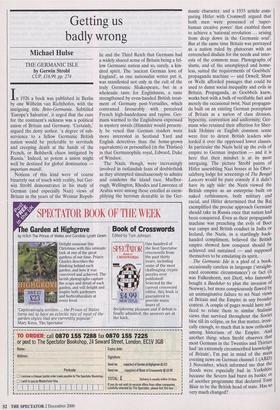Getting us badly wrong
Michael Hulse
THE GERMANIC ISLE by Gerwin Strobl
CUP, £16.99, pp. 274
In 1926 a book was published in Berlin by one Wilhelm van Richthofen, with the intriguing title Brito-Germania, Subtitled 'Europe's Salvation', it urged that the cure for the continent's sickness was a political union of Britain and Germany. 'Certainly,' argued the dotty author, 'a degree of sub- servience to a fellow Germanic British nation would be preferable to servitude and creeping death at the hands of the French, or Bolshevik chaos instigated by Russia.' Indeed, so potent a union might well be destined for global domination — imperium mundi.
Notions of this kind were of course bizarrely out of touch with reality, but Ger- win Strobl demonstrates in his study of German (and especially Nazi) views of Britain in the years of the Weimar Repub- lic and the Third Reich that Germans had a widely shared sense of Britain being a fel- low Germanic nation and so, surely, a kin- dred spirit. The 'ancient German love of England', as one nationalist writer put it, was manifested not only in the cult of the truly Germanic Shakespeare, but in a wholesale taste for Englishness, a taste strengthened by even-handed British treat- ment of Germany post-Versailles, which contrasted favourably with perceived French high-handedness and rapine. Ger- mans warmed to the Englishness expressed in mystery novels (Himmler would present- ly be vexed that German readers were more interested in Scotland Yard and English detectives than the home-grown equivalents) or personified (in the Thirties) in that Germanophile royal, Edward, Duke of Windsor.
The Nazis, though, were increasingly involved in outlandish feats of doublethink as they attempted simultaneously to admire and condemn the island race. Marlbor- ough, Wellington, Rhodes and Lawrence of Arabia were among those extolled as exem- plifying the heroism desirable in the Ger- , manic character, and a 1933 article com- paring Hitler with Cromwell argued that both men were possessed of 'super- human creative power' that enabled them to achieve a 'national revolution ... arising from deep down in the Germanic soul'. But at the same time Britain was portrayed as a nation ruled by plutocrats with an entrenched disdain for the needs and inter- ests of the common man. Photographs of slums, and of the unemployed and home- less, suited the requirements of Goebbels' propaganda machine — and Orwell, Shaw or Wells afforded passages that could be used to damn social inequality and evils in Britain. Propaganda, as Goebbels knew, works best with a bulk of verifiable fact and merely the occasional twist. Nazi propagan- da built on an existing German perception of Britain as a nation of class division, hypocrisy, convention and uniformity; Ger- mans who retained their affection for Sher- lock Holmes or English common sense were free to detest British leaders who lorded it over the oppressed lower classes. In particular the Nazis held up the evils of empire to German inspection — and it is here that their mindset is at its most intriguing. The picture Strobl paints of Hitler assembling Nazi bosses at his Ober- salzberg lodge for screenings of The Bengal Lancers would be pure comedy if it didn't have its ugly side: the Nazis viewed the British empire as an enterprise built on naked ruthlessness, both military and racial, and Hitler determined that the Raj exemplified the precise approach Germany should take in Russia once that nation had been conquered. Even as their propaganda machine was preaching the evils of Boer war camps and British conduct in India or Ireland, the Nazis, in a startlingly back- handed compliment, believed the British empire showed how conquest should be achieved and sustained — and supposed themselves to be emulating its spirit. The Germanic Isle is a plod of a book, occasionally careless in language ('straight- ened economic circumstances') or fact (it was Falkenhorst, not Dietl, who famously bought a Baedeker to plan the invasion of Norway), but more conspicuously flawed by an unimaginative failure to set Nazi views of Britain and the Empire in any broader context. A couple of pages would have suf- ficed to relate them to similar Stalinist views that survived throughout the Soviet bloc till its eclipse, or for that matter, ironi- cally enough, to much that is now orthodox among historians of the Empire. And another thing: when Strobl observes that most Germans in the Twenties and Thirties had 'an extremely circumscribed knowled4e of Britain', I'm put in mind of the main evening news on German channel 1 (AWL)) 3 November, which informed me that the floods were especially bad in Yorkshire because the Severn had burst its banks; or of another programme that declared Tony Blair to be the British head of state. Has so very much changed?


















































































 Previous page
Previous page